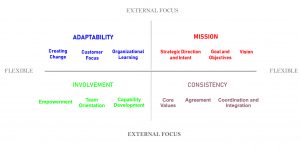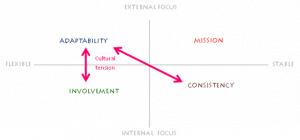Part 3: Building an entrepreneurial culture
©2011 by Karl Hellman and Robert S. Siegel
In part 1 of this series, we discussed where product managers find entrepreneurial opportunities. Part 2 focused on how product managers acquire entrepreneurial skills.
Even, as your product managers acquire new skills and find anomalies, their entrepreneurial work may still fail, if the culture of your organization resists the required changes. The organization may strive to retain old patterns.
In The Practice of Adaptive Leadership, Ronald Heifetz points out, “There is no such thing as a dysfunctional organization, because every organization is perfectly aligned to achieve the results it gets.”
To support your product managers in entrepreneurial work, your organization must learn to be entrepreneurial.
The role of leadership
We talk of “top management support of entrepreneurial product management.” But what does that mean?
First, leaders must embody the ideals of training, mentoring, and modeling entrepreneurial principles and best practices. They model the principle that failure with learning is a good thing. They seek opportunities to grow their own skills and to provide training in the fundamentals as well as unique aspects of the business to everyone.
Leaders must give product managers streamlined access to the decision makers, resources, internal SMEs, customers, industry forums, and to the world’s experts. Leaders provide product managers with security-freedom from the fear of losing their jobs if the current experiments fail. (Talented managers can keep even bad projects alive for months, even years, if they fear for their jobs or careers should the project be cancelled.)
Leaders listen. Peter Drucker recommends leaders spend half a day three or four times a year with the most junior people in R&D, marketing, operations, finance, sales, and HR. In these meetings, Drucker suggested the senior executive primarily listen to the junior people’s views of the business, ask them questions about their views, as well as answer their questions, provide perspective, and authorize the junior people to systematically follow up on their ideas.
Finding the cultural problem and solving it
Paradoxically, the most effective cultural opposition to entrepreneurial product management are other cultural virtues-core values that have become entwined with traditional practices, coordination of all departments for flawless execution of the old ways, empowerment of people to perfect the old ways.
Dr. Daniel Denison has developed a model of the forces of corporate culture which explains how these forces can work against entrepreneurial product management.
| “Understanding paradox and contradiction is critical in creating change because change often implies finding new ways to reconcile old trade offs.” | Dr. Daniel Denison is Professor of Management and Organization at IMD in Lausanne Switzerland and CEO of Denison Consulting. |
Denison’s model names four cultural forces or “traits:” Mission; Consistency; Involvement; and the entrepreneurial product manager’s friend, Adaptability.
He lays these four forces out on a two dimensional graph. The x-axis ranges from entrepreneurial-friendly “flexibility” on the left to entrepreneurial-unfriendly “stability” on the right.
![]()
| “The y-axis ranges from entrepreneurial-friendly “external-focus” on the top to entrepreneurial-unfriendly “internal focus on the bottom. |
|
The four cultural forces (and their component characteristics) go on the grid like so:

Dennison’s experience shows there the entrepreneurial product manager’s friend, Adaptability often experiences resistance from the forces of Consistency and Involvement:.
The paradox is that Consistency and Involvement are virtues: Consistency involves organizations having built “an internal system of governance based on consensual support,” according to Dennison. And Involvement is “Engaged people rely[ing] on informal, voluntary, and implicit control systems.”
The entrepreneurial product manager doesn’t want to overcome these sources of resistance to change so much as adapt these virtues to a new reality. Treat managers in other functions as you do customers. Their cultural traits are their “values” and you can appeal to these values as you do to customer values.
Next: Part 4: What to do if your organization just doesn’t want to change
Karl Hellman
is President of Resultrek (www.resultrek.com), an international marketing consulting and training firm.
Robert S. Siegel
is an experienced Product Management Executive, Content Creator and Web Developer. Mr. Siegel authors three popular blogs:
TheIdeativeProcess.com, NeaReport.com, and EndYardWork.com.









